Alkaline Body 101: The Science, Benefits, and How to Achieve It
July 24, 2023
 5910
5910 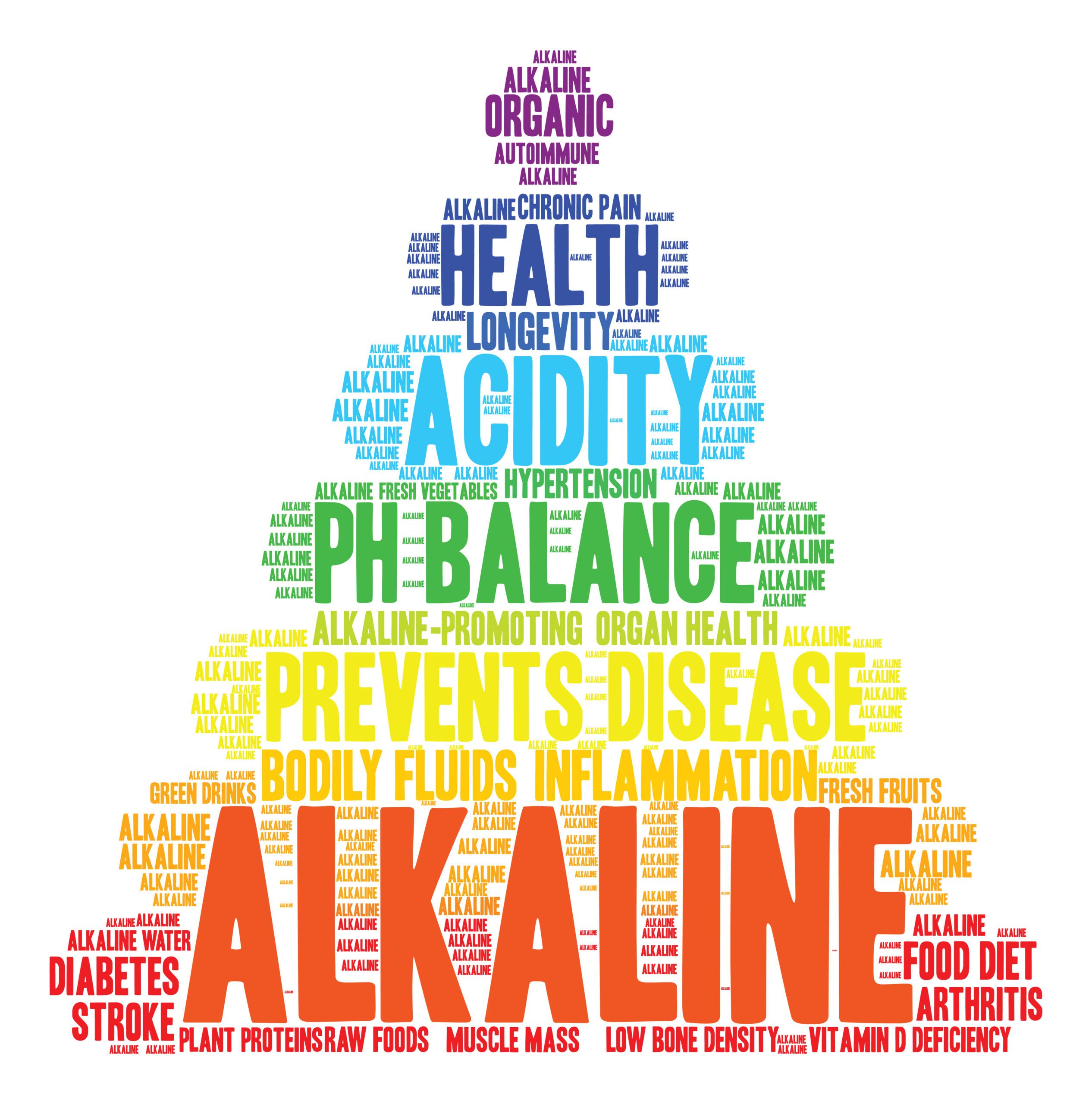
Written By: Jack Riess NASM Certified Personal Trainer and Life Long Researcher of Health and Longevity.
When you think about maintaining a healthy lifestyle, you might consider diet, exercise, and regular check-ups.
But have you ever considered the importance of your body’s pH level?
In essence, our body’s pH is a measure of how acidic or alkaline our bodily fluids are.
This delicate balance plays a crucial role in our overall health and wellness, one that is often overlooked.
The pH scale ranges from 0 to 14, with 7 being neutral. Below 7 is acidic, and above 7 is alkaline or basic.
Ideally, our body likes to maintain a slightly alkaline pH of about 7.4 in our blood for optimal functioning.
When our bodies become too acidic due to diet, stress, or environmental factors, we may encounter various health problems.
On the contrary, maintaining an alkaline body state is associated with numerous benefits, which we’ll explore in detail in this blog.
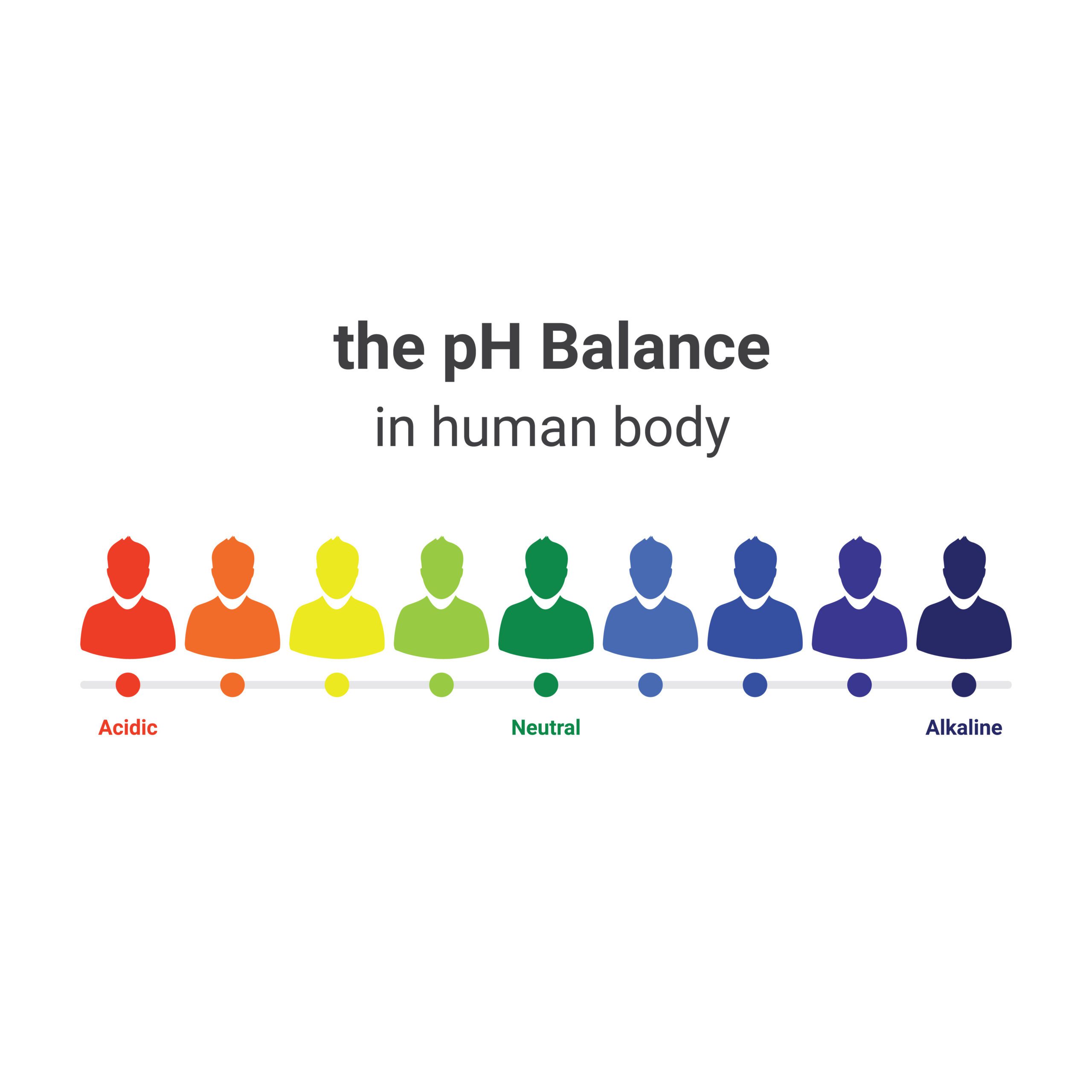
Today, we’ll take a deep dive into the fascinating world of pH and alkalinity.
We’ll discuss what pH is, how alkalinity affects our bodies, and why an alkaline body can contribute to our overall well-being.
By understanding and applying this knowledge, you can take a proactive step toward enhanced health and vitality.
Understanding pH and Alkalinity
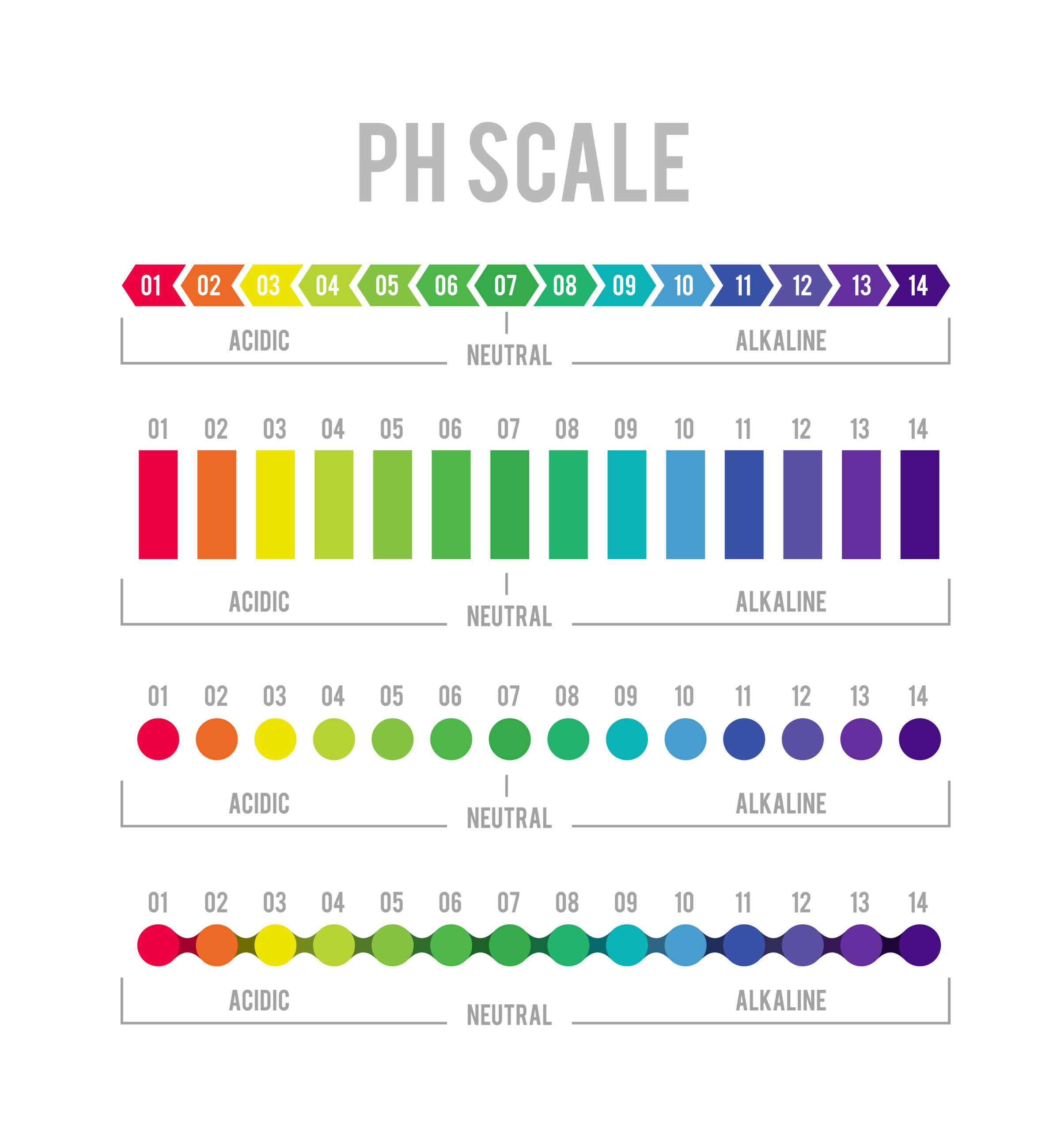
So, let’s start by understanding pH. The term “pH” stands for ‘potential of Hydrogen.’
It’s a measure of the concentration of hydrogen ions in a solution, indicating its acidity or alkalinity.
The scale spans from 0, being highly acidic, to 14, highly alkaline, with 7 being neutral, like pure water.
Every step change in pH represents a tenfold change in acidity or alkalinity.
For instance, a pH of 5 is ten times more acidic than a pH of 6.
On the alkaline side of the scale, you’ll find substances like baking soda or antacids, known for their soothing properties on an acidic stomach.
On the acidic side, substances include lemon juice or vinegar.
But don’t let these examples mislead you.
In our body, the correlation between the pH of foods we consume and the resulting pH of our bodily fluids is not direct nor straightforward.
The body’s pH affects many of our vital functions.
Enzymes, the protein catalysts that are integral to all life processes, have a narrow pH range in which they operate optimally.
Outside of this range, they become less efficient, slowing down vital biochemical reactions.
Moreover, a too acidic or too alkaline environment can affect cellular function, potentially leading to disease.
Our body works hard to keep the blood pH within a tight range, primarily through the lungs and kidneys.
While we can’t change our blood’s pH dramatically through diet, the foods we consume can significantly affect the pH of our urine, reflecting the workload of our kidneys and indirectly our metabolic health.
Understanding pH and alkalinity is the first step towards a healthier lifestyle, offering us a lens through which we can understand the profound effects of diet and lifestyle choices on our body’s balance and overall wellbeing.
The Science behind Body Alkalinity
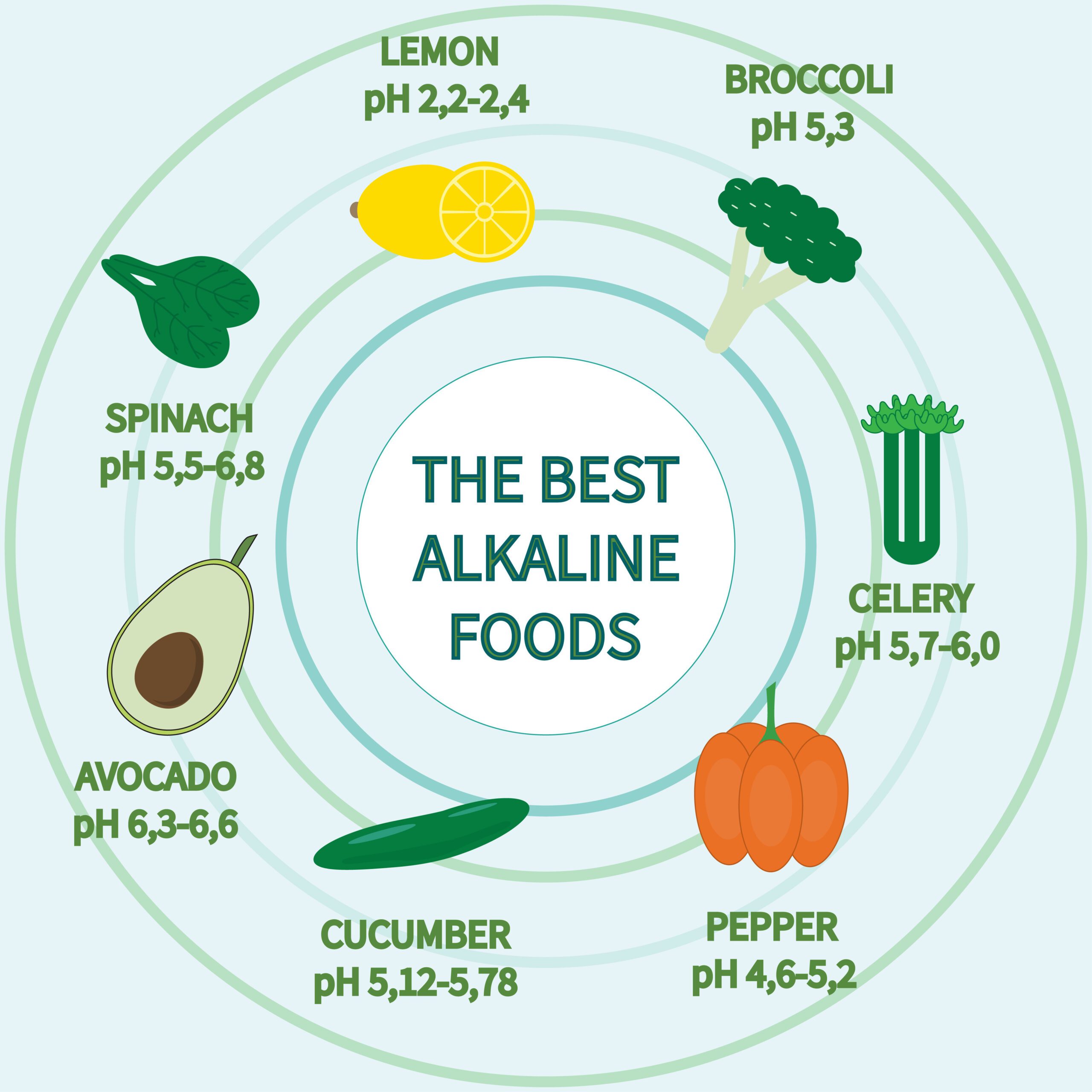
Our bodies are incredible machines, constantly working to maintain an optimal internal environment, a process known as homeostasis.
One essential aspect of homeostasis is pH regulation, primarily overseen by our kidneys and lungs.
The lungs regulate pH by managing the levels of carbon dioxide, a mildly acidic compound, in our blood.
When we exhale, we expel carbon dioxide out of the body, helping maintain the necessary pH balance.
The kidneys, on the other hand, regulate pH by excreting or retaining bicarbonate, a base that counteracts acidity.
Various factors can disrupt this delicate balance.
A diet high in acid-forming foods, such as processed foods, sugars, and certain proteins, can tip the balance towards acidity.
Lifestyle factors, including stress, lack of exercise, and poor sleep habits, can also play a significant role in acidifying the body.
Maintaining the right pH isn’t just a matter of theoretical interest.
An overly acidic body, a condition known as acidosis, can have serious health implications.
For instance, it may lead to muscle wasting, as the body breaks down muscle tissues to release alkalizing amino acids.
It might also result in kidney stones, increased blood pressure, and increased risk of diabetes and cardiovascular diseases.
Benefits of Alkaline Body

While avoiding the negatives of too much acidity is crucial, there are numerous benefits associated with maintaining a more alkaline body state.
Firstly, an alkaline body often correlates with increased energy levels and mental alertness.
A balanced pH supports oxygen delivery to cells, a fundamental process for energy production.
As such, maintaining alkalinity may help avoid feelings of fatigue and lethargy.
Secondly, an alkaline state promotes better digestion and metabolism.
It supports a healthier gut microbiome, which not only aids digestion but is also essential for synthesizing certain vitamins and bolstering immune function.
Speaking of immunity, a balanced pH contributes to an enhanced immune system.
The immune system relies heavily on optimal enzymatic function, which, as discussed, is pH-dependent.
A balanced pH environment supports overall immunity and disease resistance.
Another benefit of maintaining alkalinity is better detoxification and antioxidant protection.
Our bodies naturally generate reactive molecules, also known as free radicals, as by-products of metabolism.
These free radicals can cause oxidative stress, potentially damaging cells.
An alkaline environment can help neutralize these harmful substances, thereby reducing oxidative stress and protecting cells.
Lastly, research suggests that maintaining an alkaline body may reduce the risk of certain chronic diseases.
While more research is needed to fully understand these implications, initial findings suggest that an alkaline diet could have protective effects against conditions such as osteoporosis and kidney diseases.
In essence, keeping our bodies as alkaline as possible could be one of the most effective strategies we have for preserving and enhancing our overall health.
Alkaline Diet: What You Need to Know
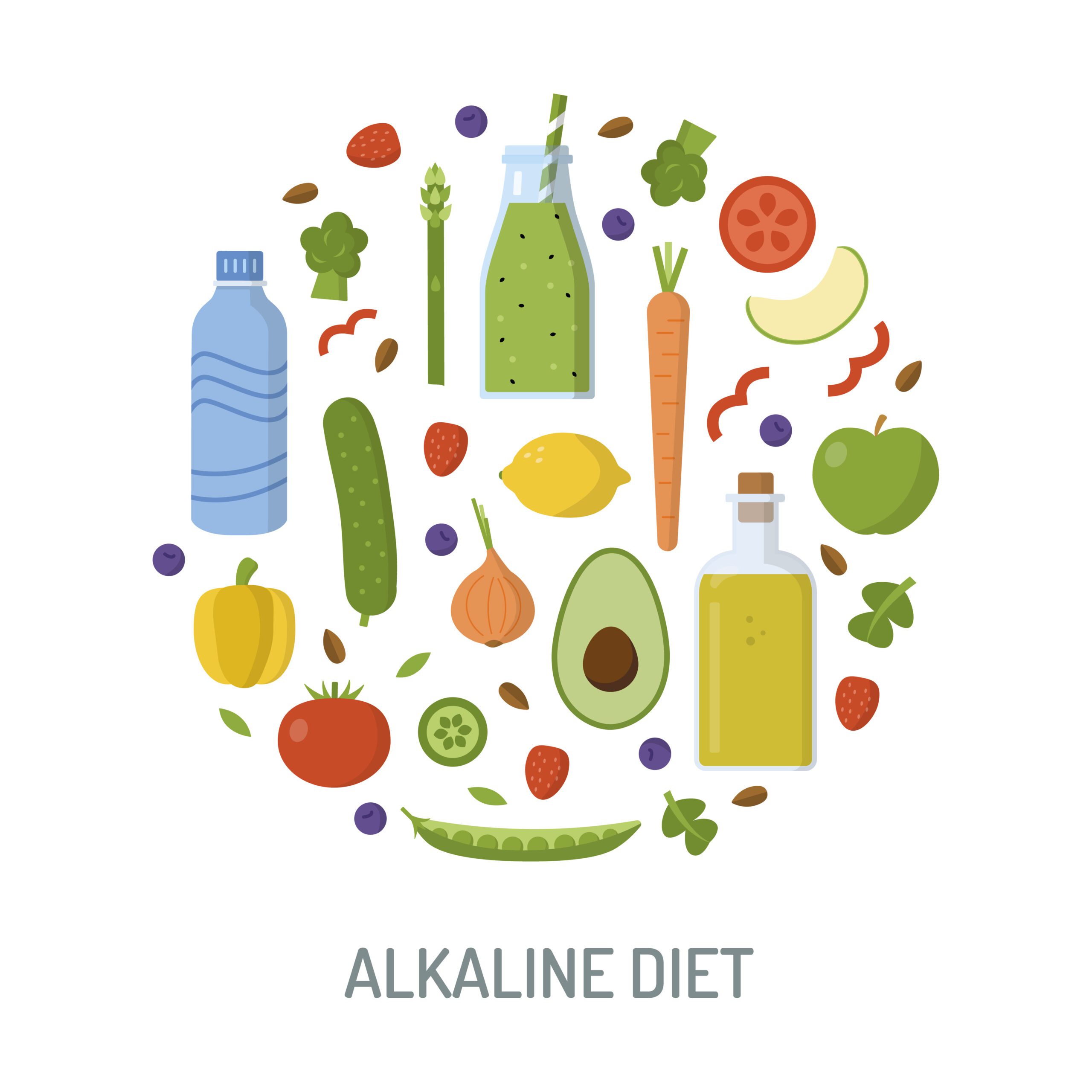
When it comes to enhancing body alkalinity, diet plays a significant role.
The alkaline diet, also known as the acid-alkaline diet, is based on the idea that replacing acid-forming foods with alkaline foods can improve health.
It’s important to note that alkaline foods are not necessarily alkaline by nature. Instead, they’re foods that have an alkalizing effect on the body.
This effect is measured by the potential renal acid load (PRAL) – a value that predicts a food’s potential to create acid or alkali in the body.
Fruits and vegetables, which are high in potassium, magnesium, calcium, and bicarbonate, typically have a strong alkalizing effect.
Alkaline-promoting foods include leafy green vegetables (spinach, kale, lettuce), root vegetables (beets, carrots, radishes), fruits (especially bananas, avocados, and citrus), nuts and seeds, and tofu, among others.
Consuming these foods can help balance the pH level in our body, thereby promoting better health and well-being.
While the alkaline diet has its benefits, it’s important to exercise a balanced approach and not fall for certain misconceptions.
For instance, while lemons and vinegar are acidic, they are alkaline-forming in the body, and healthy proteins, like fish or lean meat, can be acid-forming, yet are essential for health.
Also, our body tightly controls blood pH and we can’t dramatically change it through diet alone.
The goal is not to eliminate all acid-forming foods but to create a balanced, nutrient-rich diet that supports overall health.
Lifestyle Changes to Enhance Body Alkalinity

Apart from diet, other lifestyle modifications can also contribute to maintaining an alkaline state in your body.
Hydration plays a pivotal role in maintaining body alkalinity.
Drinking enough water helps flush out toxins and excess acids from the body.
Mineral water, rich in alkalizing compounds like magnesium and calcium, can be especially beneficial.
Exercise is another essential element.
Regular physical activity helps improve metabolic function and remove acid waste products from the body.
Whether it’s a brisk walk, yoga, or a high-intensity workout, any form of exercise that you enjoy and can maintain regularly can contribute to your body’s alkalinity.
Managing stress and ensuring restful sleep are also crucial.
Chronic stress and lack of sleep can disrupt various physiological processes, including pH balance.
Incorporating mindfulness practices, like meditation or deep-breathing exercises, and ensuring 7-9 hours of quality sleep per night can support your body’s alkaline balance.
Finally, avoiding or limiting the intake of alcohol, caffeine, and tobacco is advisable.
These substances can contribute to an acidic state and have various other health implications.
In essence, enhancing body alkalinity isn’t just about eating the right foods; it’s about creating a lifestyle that supports balance, well-being, and overall health.
Remember, small, consistent changes can have a substantial impact over time. Start where you are, do what you can, and your body will thank you for it.
Misconceptions and Myths about Body Alkalinity

While the benefits of maintaining an alkaline body are considerable, it’s essential to address some common misconceptions.
One such myth is that an alkaline body can prevent or cure cancer.
While it’s true that cancer cells often thrive in an acidic environment, there’s no conclusive scientific evidence to suggest that an alkaline diet alone can prevent or treat cancer.
This is a complex disease with a multitude of contributing factors.
A balanced, nutrient-rich diet and a healthy lifestyle can certainly support overall health and potentially reduce the risk of many diseases.
However, it’s not a foolproof shield against all health problems.
Claims that suggest otherwise often lack robust scientific backing and can be misleading.
Also, caution is advised against extreme diets and practices in the pursuit of alkalinity.
Radical dietary changes without medical supervision can lead to nutrient deficiencies and other health issues. As always, moderation and balance are key.
Try it Out!

In this journey through the world of pH and alkalinity, we’ve learned about the importance of maintaining an alkaline body state.
We delved into how our body regulates pH, the benefits of alkalinity, and ways to enhance body alkalinity through diet and lifestyle changes.
We also clarified common misconceptions related to alkalinity.
Adopting a balanced, nutrient-rich diet, staying hydrated, exercising regularly, managing stress, getting quality sleep, and reducing intake of alcohol, caffeine, and tobacco are all steps toward a more alkaline and healthier lifestyle.
Remember, it’s not about perfection, but about making better choices, one step at a time.
Your body is your lifelong companion, and taking care of it is one of the greatest investments you can make.

A new study suggests that a widely used sugar substitute found in diet sodas, chewing gum, and low-sugar yogurt may elevate insulin levels. This could increase the long-term risk of heart disease. “Artificial sweeteners have infiltrated nearly all types of food, making it crucial to understand their long-term health effects,” said Yihai Cao, senior author […]

Diet Coke has long been a fan-favorite among soda lovers who want a fizzy, guilt-free alternative to traditional soft drinks. While its zero-calorie, zero-sugar label makes it seem like a healthier option, the reality is far more concerning. Despite its undeniable popularity, Diet Coke’s nutritional profile has raised red flags among health experts for years. […]

New study shows that embracing an anti-inflammatory, plant-forward diet can support cognitive function and help reduce the risk of dementia. What You Eat Shapes Your Brain The food you eat doesn’t just impact your body—it also affects your brain. Research suggests that eating an anti-inflammatory, plant-based diet can help improve memory, focus, and overall brain […]